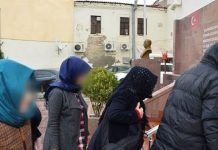A former civil servant who was summarily dismissed from his job with a government decree after a coup attempt in Turkey on July 15, 2016 said he was not reinstated to his job although a court acquitted him of all charges, TR724 news website reported.
The man, whose name was not released, approached opposition İYİ Party leader Meral Akşener during a rally in eastern Van province yesterday. “I was working in the health sector when I was fired,” he said. “Not only was I not reinstated after being acquitted, but a man who identified himself as the nephew of a Justice and Development Party [AKP] deputy demanded a 150,000 lira bribe to help me.”
The man said he was acquitted more than two years ago but that his case was with the Supreme Court of Appeals. He added that he had suffered from the consequences of being fired for the past five years and refused to pay the bribe.
Following the failed coup, the Turkish government declared a state of emergency and carried out a massive purge of state institutions under the pretext of an anti-coup fight. More than 130,000 public servants, including 4,156 judges and prosecutors, as well as 29,444 members of the armed forces, were summarily removed from their jobs for alleged membership in or relationships with “terrorist organizations” by emergency decree-laws subject to neither judicial nor parliamentary scrutiny.
The Justice for Victims Platform and Peoples’ Democratic Party (HDP) deputy Ömer Faruk Gergerlioğlu released a joint report in July 2020 which said that the two-year-long state of emergency declared after the coup caused immense suffering among civil servants who were dismissed from their jobs by the government as well as their families.
“The decree-law victims not only were removed from their jobs but also barred from seeking employment in the private sector and denied access to social security benefits,” said Gergerlioğlu.
The dismissed civil servants lost 70 percent of their average monthly income, a circumstance that reduced them to dire financial straits, according to a survey conducted for the joint report.
The survey indicates that 99.1 percent of the victims are college or university graduates or holders of master’s or doctoral degrees, which means an immense loss of human resources for Turkey’s public administration.
According to the victims’ family members taking part in the survey, the biggest problem they have been facing is economic hardship (97.9 percent) followed by psychological problems (88.6 percent), loss of social prestige and social exclusion (83.7 percent), disintegration of social circles (83.1 percent), unemployment/lack of employment (80.4 percent) and lack of social security (73.2 percent), respectively.
















